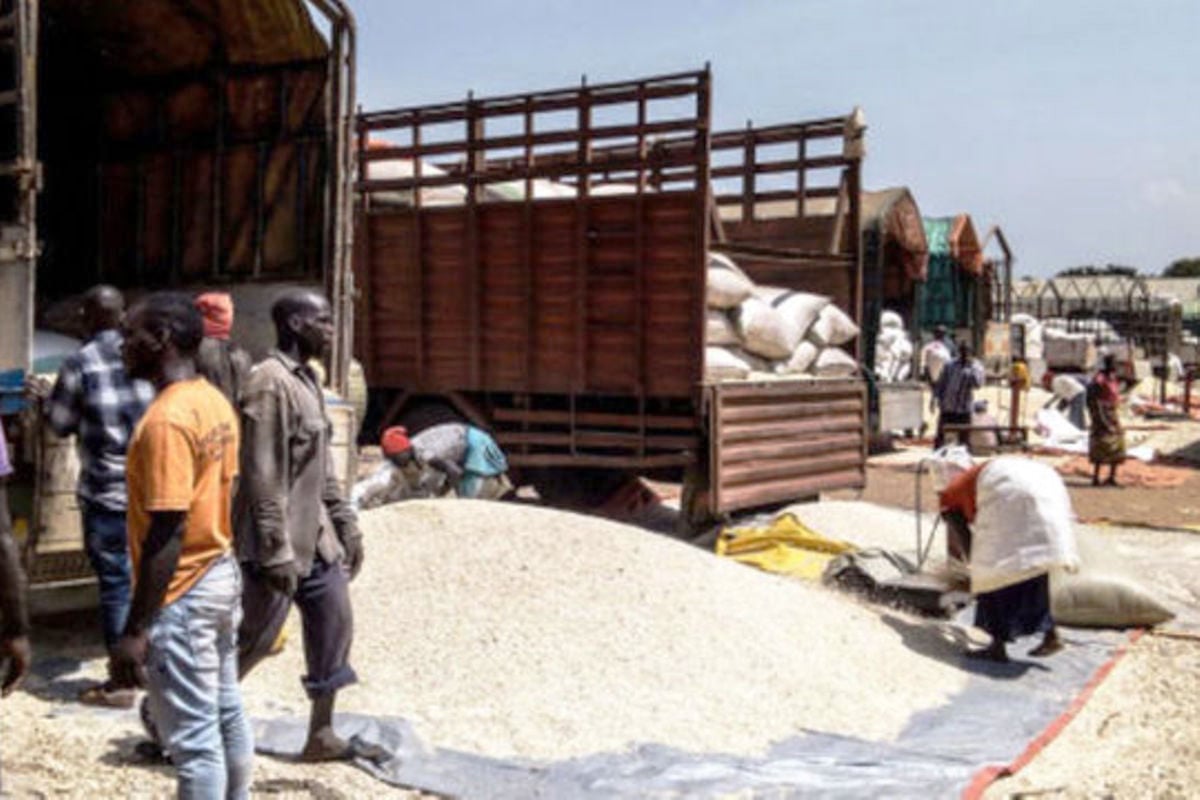Coronavirus: Public places not observing directives

Not bothered? Traders and shoppers go about their businesses at Kikuubo in downtown Kampala. There were neither sanitisers nor water and soap for washing hands at both entry and exit points of the shopping lane. PHOTOS BY ALEX ESAGALA
What you need to know:
Loopholes. Bus and taxi parks and markets were found not to be enforcing the measures, with some markets resorting to using lemon and warm water as sanitiser substitutes.
A quick check of key public places by Saturday Monitor found many not observing key guidelines issued by the President to prevent the spread of the deadly coronavirus (Covid-19), now killing thousands of people across the world.
Bus and taxi parks and markets were largely not enforcing the measures, with some markets resorting to using lemon and warm water as sanitiser substitutes.
President Museveni on Wednesday evening ordered all schools and tertiary institutions closed and stopped all public gatherings, including prayers in churches and mosques and also banned discos, and music concerts for the next 32 days.
The pronouncement came after Uganda’s neighbours Kenya, Tanzania, Rwanda, DR Congo, and South Sudan all registered cases of persons testing positive for Covid-19.
But the President said concentration points like factories, parks and industries will continue operating but with approved standard operating procedures (SOPs) issued by the Ministry of Health.
Places like shopping malls, formal markets, hospitals, prisons, taxi and bus parks are usually clogged with people and provide perfect environments for the spread of the contagious disease.
Hospitals
A spot check at Naguru Hospital in Kampala, one of the facilities designated by government to handle Covid-19 cases, had no enforcement of the said measures at the entrance.
There was only a 10-litre jerry can with water but no sign of any soap, detergent or alcoholic ingredients recommended for washing hands to kill off or disable the virus. There were also two cans of sanitisers at the outpatient department of the hospital.
When contacted about the apparent lapse at access points of the hospital, officers at the reception said: “We can’t talk to you because we are not authorised to talk to the media or any other person. It would be best to contact the Ministry [of Health] for a comment.”
But the sparsely populated Kisugu Health Centre III at Namuwongo, East of Kampala, had at its entrance a 10-litre jerry can of water mixed with liquid soap for people to wash their hands. A woman also stood by to help visitors sanitise their hands before entering the facility.
Mbarara Regional Referral Hospital had two tanks of 50 litres filled with water and soap at its two main entrances, with two security officers to enforce the measure.
Dr James Elima, the director of Gulu Regional Referral Hospital, told Daily Monitor that the hospital had stocked adequate hand sanitisers and other disinfectors.
“We received enough supply from the National Drug Authority, World Health Organization and UNICEF. We believe we shall never run out of stock at any one minutes,” Dr Elima said.
Ms Josephine Anying, the St Mary’s Hospital Lacor spokekesperson, said the hospital administration had fully complied with the President’s directive.
“Besides asking people to wash their hands frequently with soap or use alcohol-based hand rub; we have intensified our health education to create a better understanding about the virus and how we can prevent it from spreading,” Ms Anying said.
Ms Gloria Aloyo, the Gulu District spokesperson, said the district has instituted a taskforce to ensure the measures are implemented.
“The district has resolve to work with Lacor Hospital as far as handling cases is concerned. They have a fully equipped isolation unit and in case of any emergency, they are ready to help us,” Ms Aloyo said.
Prisons
The Uganda Prisons Service (UPS) have banned visits to inmates for 30 days as a preventive measure against coronavirus, starting yesterday.
The institution also directed all new prisoners coming from courts of law to be isolated for 14 days to enable them monitor their health to prevent any possible threat.
“All prison units have been provided with sanitisers and personnel instructed to observe the one-metre distance between persons in all facilities. All upcoming prison functions have also been suspended, Mr Frank Baine, the UPS spokesperson, said.
Mr Baine said precautionary measures have to be observed at the courts of law to ensure safety.
“We have a prison national taskforce based at the headquarters to coordinate all our efforts against coronavirus. All prison units are now linked to either a private or public hospital for any emergency,” he said.
Workers speak out
Leaders have asked the government to increase efforts and allocate resources towards safeguarding workers, saying the current measures of using sanitisers are not adequate.
Mr Robert Wanzusi Matukhu, a workers’ councillor at Kampala Capital City Authority, said the low enforcement of guidelines in workplaces is due to non-involvement of the Ministry of Labour and employers.
He said there is need to step up labour inspection to ensure compliance with the guidelines and that workplace committees should be set up to monitor the health of the workers during work.
Additional reporting by By Polycap Kalokwera and Alfred Tumushabe

No sanitiser. Passengers board a mini-bus at Gulu Stage in New Tax Park yesterday without any form of sanitising.
Transport sector
Whereas President Museveni said transport companies should be given mandatory standard operating procedures by the Ministry Health, Mr Haruna Wamala, the vice chairperson of Rubaga Stage at the Old Taxi Park, said the measure are not enforced.
“No one at the Old Taxi Park has complied with the President’s directive. Entry and exit points to the park have not witnessed any change and nothing has been put in place. We are still in the old set up,” Mr Wamala said.
“We can’t afford buying for the passengers sanitisers,” Mr Wamala told Saturday Monitor.
Friendship Bus Company manager Alfred Okot said they have made it mandatory for all their clients to wash their hands before boarding their buses.
“We have our water mixed with jik and a passenger must first wash their hands before entering the bus. And afterwards, we also give them hand sanitiser to rub in their hands,” Mr Okot said.
At Namayiba Bus Terminal, a facility with buses plying the Kenya, Burundi, Rwanda, South Sudan, and Tanzania routes, there were sanitisers at entry points.
Several bus boarding points and ticket issuance points also had cans of sanitisers to cater for the passengers.

Not heeding. There was not any form of sanitising before accessing Usafi Market in Kampala yesterday.
Markets
Nakasero Market had no water, soap, sanitisers or any other measures being implemented. When asked why they didn’t have anything, the traders said they had resorted to using lemon and warm water as substitutes.
“We already have natural remedies we are using. Lemon mixed in water works very well. Squeezing lemons into one’s hands and wiping over the nostrils is substantial and serves the same purpose,” Ms Joweria Ndagire, a trader, said.
“A bag of lemon now costs Shs120,000, up from Shs60,000,” she added.
At Kikuubo downtown Kampala, vendors were not in synch with the guidelines the President issued. There were no thermometer guns and sanitisers, no soap and water at any of its entry and exit points.




